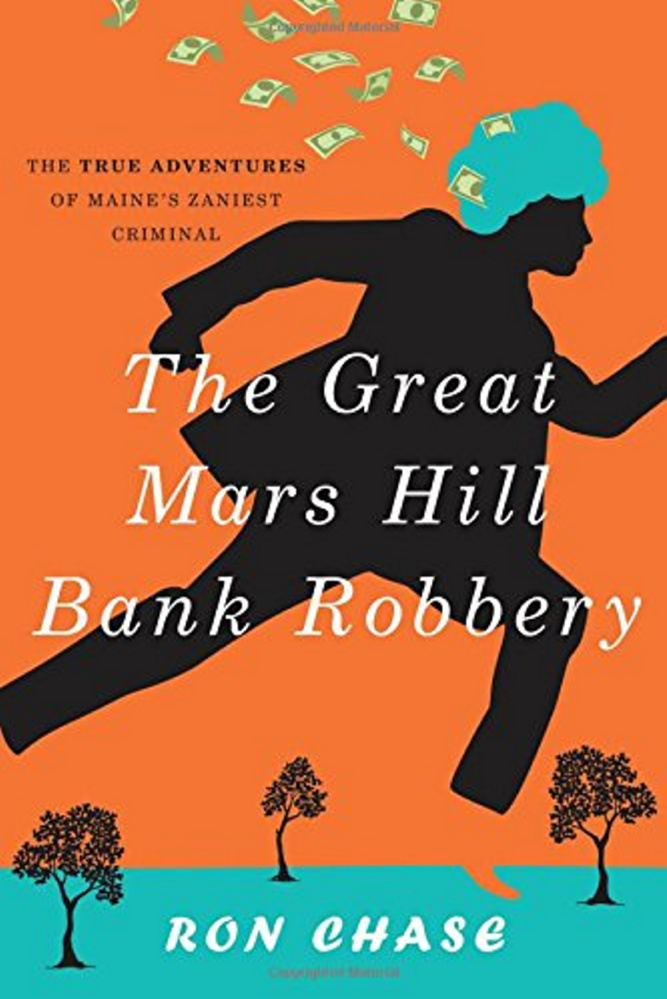In his humorous and sometimes poignant book, author Ron Chase tells how decorated Vietnam veteran Bernard Patterson robbed his hometown’s Mars Hill Northern National Bank of $177,000 in 1971 and escaped to Europe with suitcases stuffed with money.
Patterson, who died in 2003, eluded an international manhunt for 11 months while living a decadent life in France, England and Switzerland. His favorite hideout was Villars-sur-Ollons, a skiing destination in the Swiss Alps where Patterson rented a mansion with his ill-gotten wealth and, for an entire winter, lured dozens of women to share his food, fine wines and bed.
When law enforcement eventually traced Patterson, he fled by motorcycle to Yugoslavia. Further wanderings brought him to Morocco, where he swapped his motorcycle for a camel in a near-fatal attempt to cross the Sahara Desert.
“The Great Mars Hill Bank Robbery” succeeds as a fast and exciting read through Chase’s thorough research into life events that turned a poor Mars Hill native into a man who faced life-threatening danger in his quest for wealth.
If there’s a fault to the book, it’s the author’s occasional portrayal of his character as a folk hero who, like Robin Hood, goes about redistributing wealth.
Patterson did give some money away, including a handful of franc notes handed to an elderly woman down on her luck.
But Patterson is basically a crook and a womanizer with an alcohol problem that hastened his early death.
Still, Chase tells a fascinating story of a driven man’s rise and fall.
Growing up mostly parentless in Mars Hill, Patterson quit school after eighth grade, but he was a math genius. “Bernard could learn more in two days than the rest could in a week,” Chase quotes a teacher as saying.
Seminal experiences that shaped Bernard were three tours of duty in Vietnam in which he volunteered as a tunnel rat – a high-fatality job for American GIs who descended into Viet Cong tunnels to kill the enemy with handguns and knives.
Five feet, three inches tall, Patterson “excelled in this violent perilous world,” Chase writes. He was awarded four Bronze Stars and recommended for a Silver Star for valor.
Off duty in Vietnam, Patterson was no hero. He traded currencies on the black market. He sold American military equipment to the Vietnamese, and he came home on leave with marijuana that he sold in Maine.
The army denied Patterson’s request for a fourth tour of duty as a tunnel rat. “Perhaps,” the author writes, “the symptoms of post-traumatic stress disorder (PTSD) had already manifested themselves.”
Home in Mars Hill and once again poor, Patterson picked November 1971 to rob the local bank. In preparation, he stashed a rubber get-away raft next to the Prestile Stream that runs through town.
On a Friday evening when the bank was open late, he faked a fire alarm that had police and firefighters rushing out of town.
Then, Patterson walked into the bank wearing a reddish brown wig, his face disguised with a potato picker’s blue bandanna. The gun he carried was a toy.
Tellers obligingly dumped cash into two large bags. Staggering out the door with his load, the former tunnel rat crossed Main Street and struggled down an embankment to the rubber boat he hoped to float downstream to Canada.
It immediately overturned, drenching both moneybags and Patterson in 40-degree water.
The story of escape from early disaster in the murky Prestile to high life in Europe gets a lot more bizarre, and Chase reveals details in a way that makes for a page-turner.
Patterson is, of course, eventually caught. Because he’s a Vietnam hero likely suffering from PTSD, a Maine judge gives him a relatively lenient sentence in a federal lockup, where Patterson studies marijuana culture in the prison library, leading to a final adventure deftly told in “The Great Mars Hill Bank Robbery.”
Lloyd Ferriss is a writer and photographer who lives in Richmond.
Send questions/comments to the editors.



Success. Please wait for the page to reload. If the page does not reload within 5 seconds, please refresh the page.
Enter your email and password to access comments.
Hi, to comment on stories you must . This profile is in addition to your subscription and website login.
Already have a commenting profile? .
Invalid username/password.
Please check your email to confirm and complete your registration.
Only subscribers are eligible to post comments. Please subscribe or login first for digital access. Here’s why.
Use the form below to reset your password. When you've submitted your account email, we will send an email with a reset code.